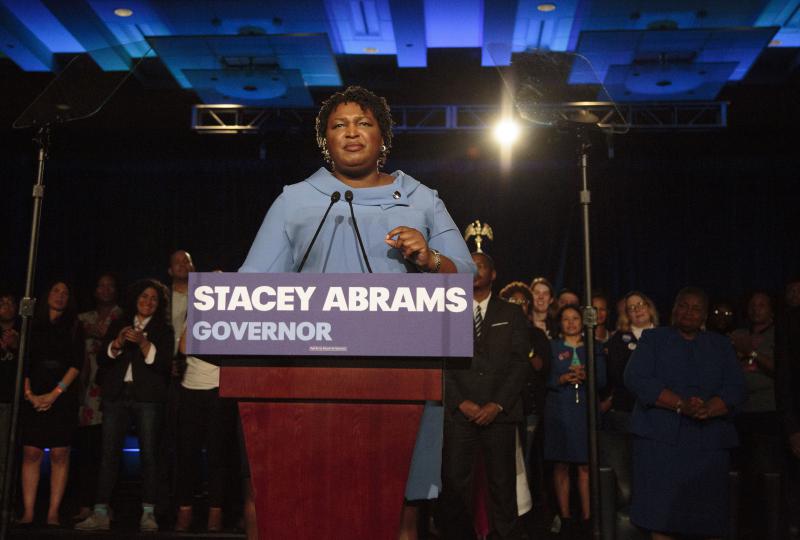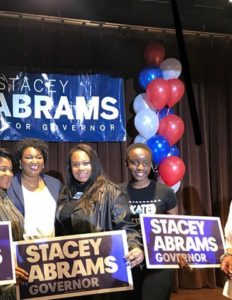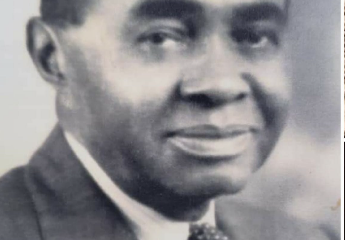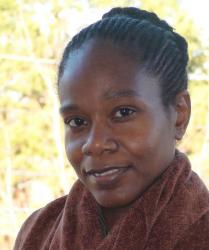Featured
Georgia’s Gubernatorial Candidate Stacey Abrams Plans for Runoff

In Georgia the day after the Midterm election starts with a question mark. The Georgia governor’s race is one of the closest races in that state’s history with Democrat Stacey Abrams trailing Republican Brian Kemp by a slim margin. But, Abrams, who was positioned to become the nation’s first black female governor, says it’s not over yet.
“There are votes that remain to be counted,” Abrams said during a speech to her supporters late last night. “There are voices that are waiting to be heard. Across our state folks are opening up the dreams of voters and absentee ballots, and we believe our chance for a stronger Georgia is just within reach. But we cannot seize it until all voices are heard, and I promise you tonight we’re going to make sure that every vote is counted. Every single vote.”
She is also urging Georgia voters to get ready for a runoff once absentee ballots are tallied, according to news reports.
For many of her supporters, there is little surprise that race is so close.
Georgia’s Red History
Former Georgia Democratic Senator Sam Zamarippa said days before the election that if Abrams loses it would be close. And a former employee predicted a difficult battle.
“It’s a tough state for a Democrat to win, let alone a woman,” said Jonathan Gaul, a business litigation lawyer who has known Abrams since 2003 when she was Atlanta’s deputy city attorney, and he was the city’s senior attorney. Now with a runoff possible, it’s still too early to say Abrams won’t make history and get a chance to make the changes she championed in her campaign.
“She’s knowledgeable about the state, she knows the politics and she wants to fix things and make things even better for everyone,” Gaul said.
Throughout the race there were difficulties with issues about voter suppression and a reported hacking attempt on Sunday.
Zamarippa said democracy is more a competitive sport than a fair system. “If you think democracy is fair, you don’t quite get it.
“Democracy does not guarantee anyone an easy fight,” he said.
Gaul said there has been a conscious effort to keep votes down and to disenfranchise some voters. He said it’s been that way for years. “If she’s able to overcome that, it will be huge.”
Days before the election, as the nation waited to see who will control Congress, former President Barack Obama and media mogul Oprah Winfrey visited Georgia, a historically red state, to show their support for Abrams and other Democratic candidates.
That may have helped motivate the historic 50,000 new voters joining the race. On Monday, music blasted from a home in an Atlanta neighborhood where a group of mostly young white women gathered in support of Abrams. A sign was posted prominently in the yard, “Asians for Abrams.”
Down to the Wire
On Election Day, supporters gathered on the side of the road in DeKalb County holding signs in support of Abrams. Others waited hours in line, even after human error and machine failure caused lengthy delays in some areas and led to some polling stations to remain open as late as 10 p.m. More than two million voters cast their ballots before election day, shattering the 2014 record, according to news reports.
Still, some never thought Abrams would win in a state that hasn’t elected a Democratic governor in two decades. In order to win the Minority leader of Georgia’s Legislature would need record minority turnout and to carry 25 to 30 percent of the white vote, according to an article by Time magazine.
Dr. William Boone, a political science professor at Clark Atlanta University, agreed.
“The biggest challenge will be whether she can peel off some of the white votes, particularly white women,” Boone said days before the election. And for that, he said, “She has to go all over the state. She cannot win by simply winning metro Atlanta.”
Abrams has always been progressive, and it showed in her campaign. She got out early, targeted the Democrats who stayed home in the primary and who didn’t register to vote. She went after the rural voters focusing on healthcare and, unlike her predecessors, embraced liberal issues like gun control and the expansion of Medicaid.
“Stacy is the first candidate to make a wholesale commitment to grassroots engagement,” Zamarripa said. Abrams spent most of her time and energy reaching voters in key markets. While her predecessors focused on just buying big media, she stepped out, he said.
“Reaching and touching people and getting them to believe in you,” is what makes you a winner, Zamarippa said, adding, “And if you can do that on a statewide basis, you can win in Georgia. “Thirty seconds on television is no substitute for shaking someone’s hand.
“Her chance of winning depends on how effective those efforts have been,” he said. Still, no matter the outcome, “Stacy Abrams’ campaign will be remembered as a key moment in politics,” Zamarippa said.
Committed Young Voters
Mary-Pat Hector, a 20-year-old senior at Spelman College, Abrams’ alma mater, has been involved in politics since she was 11-years-old and sees it as her moral obligation.
Hector said, “So many people died or went to jail just for us to have this right. If you don’t do it for yourself, it’s important for you to do it for those who are no longer here or no longer has the right to.”
 Hector, national youth director of National Action Network (NAN) since she was 14, helped with the Abrams’ campaign by organizing events on her college campus and encouraging others to vote.
Hector, national youth director of National Action Network (NAN) since she was 14, helped with the Abrams’ campaign by organizing events on her college campus and encouraging others to vote.
“We can make noise about issues such as police brutality, education, but unless we solve these issues through policy and accountability then nothing will really change,” Hector said. That’s why she wanted to see Abrams win.
“People of color are marginalized across the country and everyone should have access to education,” said Hector, who voted early. As for the criminal justice system, she believes like Abrams that everyone deserves a second chance.
She also agrees that Georgia should be a sanctuary state for immigrants and decries harsh treatments against immigrants who she said, “only want a better future for their children.”
“I’m extremely proud, not only because she attended my institution, but to see her get out and run,” Hector said. ‘I’m proud she made it this far and that she was willing to put herself out there to make a better Georgia.”
And, today, like many others, Hector is waiting to see what happens next.

-

 Black History5 months ago
Black History5 months agoThe untold story of a Black woman who founded an Alabama hospital during Jim Crow
-

 Featured9 months ago
Featured9 months ago‘No Closure’ In Town Where Five Black Residents Were Either Murdered, Died Suspiciously Or Are Missing
-

 Black History9 months ago
Black History9 months agoBlack History Lost and Found: New Research Pieces Together the Life of Prominent Texas Surgeon and Activist
-

 Featured9 months ago
Featured9 months agoFounder of “The Folding Chair” Podcast Calls Montgomery’s Brawl ‘Karma’
-

 Featured8 months ago
Featured8 months agoThousands ‘Live Their Dream’ During National Black Business Month
-

 Featured10 months ago
Featured10 months agoJuneteenth And ‘246 Years Of Free Labor’ Are Key To Conversations About Reparations







